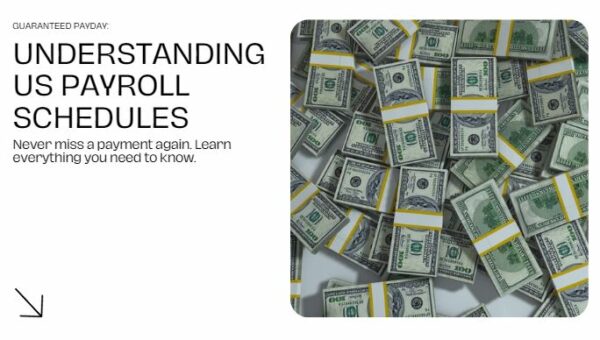Getting paid is exciting, isn’t it? It’s that time when your hard work turns into cold, hard cash. But have you ever wondered why you get paid on certain days and not others? Understanding payroll schedules can help you manage your finances better and plan for the future.
In this article, we’ll dive into the world of US payroll schedules, exploring how they work and what you need to know to ensure you receive your guaranteed payday.
What is a Payroll Schedule? A payroll schedule is a plan that outlines when employees get paid.
It’s like a calendar that shows the dates when paychecks are issued. Employers follow different payroll schedules based on factors like company policy, industry standards, and state regulations.

What is a Payroll Schedule?
A payroll schedule is simply a set plan that your employer uses to determine when and how often you’ll receive your paycheck.
It outlines the pay period (the timeframe for which you earn wages) and the payday (the specific day you get paid).
Types of Payroll Schedules
- Weekly: With a weekly schedule, employees get paid every week, typically on the same day, such as every Friday.
- Bi-weekly: Bi-weekly pay schedules mean employees receive their paychecks every two weeks, usually on a specific day of the week.
- Semi-monthly: In a semi-monthly schedule, employees are paid twice a month, often on the 15th and the last day of the month.
- Monthly: Monthly pay schedules mean employees receive their pay once a month, usually on the same day each month.
Understanding Your Payroll Schedule
It’s essential to understand your company’s payroll schedule to manage your finances effectively. Here are some key points to consider:
- Know Your Payday: Find out when you can expect to receive your paycheck. Mark it on your calendar or set a reminder to ensure you don’t forget.
- Budget Accordingly: Plan your expenses based on your payday. If you’re paid bi-weekly, for example, you’ll need to budget for two weeks’ worth of expenses until your next paycheck.
- Understand Deductions: Familiarize yourself with any deductions taken from your paycheck, such as taxes, healthcare premiums, and retirement contributions.
- Keep Track of Hours Worked: If you’re paid hourly, make sure your timesheets are accurate to avoid discrepancies in your paycheck.
Factors Affecting Payroll Schedules
Several factors can influence a company’s payroll schedule:
- Industry Standards: Some industries, like retail and hospitality, often use weekly or bi-weekly pay schedules to align with busy work periods.
- Company Policy: Employers may choose a payroll schedule based on company policy and what works best for their business operations.
- State Regulations: States may have specific laws regarding payroll schedules, such as minimum pay frequency requirements.
- Payroll Processing Time: Payroll processing takes time, especially for large companies with many employees. The payroll department needs time to calculate wages, deductions, and taxes accurately.
Your Rights Regarding Payday
Federal law, under the Fair Labor Standards Act (FLSA) by the Department of Labor (DOL), requires employers to pay most covered employees at least twice a month https://www.dol.gov/agencies/whd/flsa.
However, there are some exceptions, and specific states might have stricter laws mandating more frequent paychecks.
Here are some key points to remember about your right to get paid on time:
- Frequency: As mentioned earlier, FLSA mandates at least bi-monthly pay, but some states require more frequent payments (check with your state’s Department of Labor for specifics).
- Timeliness: Your employer must pay you on the designated payday according to the agreed-upon schedule.
- Form of Payment: By default, employers can pay you by check, but with your written consent, they can also use direct deposit into your bank account.
- Late Payment: If your employer fails to pay you on time, you’re entitled to take action. You can file a complaint with the Department of Labor’s Wage and Hour Division https://www.dol.gov/agencies/whd.
Tips for Managing Your Finances with Different Pay Schedules
Regardless of your payroll schedule, here are some helpful tips for managing your money effectively:
- Budgeting: Create a budget that aligns with your pay frequency. Allocate funds for essential expenses like rent, utilities, and groceries, and plan for savings and debt repayment.
- Scheduled Transfers: Set up automatic transfers to a savings account on payday to build an emergency fund or reach financial goals.
- Bill Payment Planning: Schedule your bill payments to coincide with your paydays to avoid late fees.
- Explore Direct Deposit: Direct deposit ensures your paycheck gets electronically deposited into your bank account on payday, eliminating the risk of lost or stolen checks.
Official Resources for Understanding Payroll Schedules
To learn more about payroll schedules and your rights as an employee, you can refer to official resources such as:
- U.S. Department of Labor (DOL): The DOL provides information on federal labor laws, including regulations related to payroll schedules and pay frequency.
- [Official Link: www.dol.gov]
- Internal Revenue Service (IRS): The IRS offers guidance on tax withholding and reporting requirements for employers, which can affect payroll schedules.
- [Official Link: www.irs.gov]
- State Labor Departments: Each state has its own labor department that oversees employment laws, including regulations concerning payroll schedules and pay frequency.
Conclusion
Understanding your payroll schedule is crucial for managing your finances and ensuring you receive your guaranteed payday on time.
By knowing when you’ll get paid, budgeting effectively, and staying informed about relevant regulations, you can navigate the world of payroll with confidence.
Remember to utilize official resources to learn more about your rights and responsibilities as an employee.
